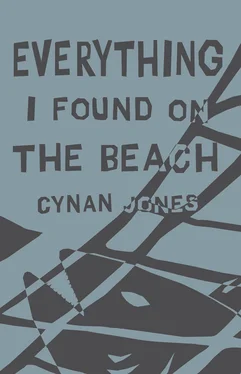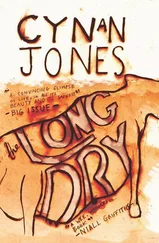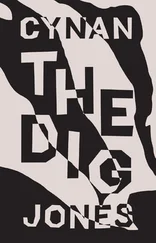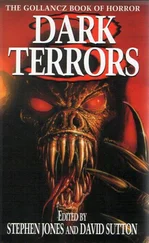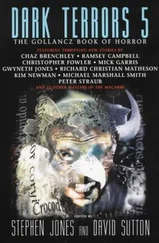He smashed up the other phone and took it out and put it in an old wheelbarrow and poured in some gas and lit it up. He thought of the pictures he was burning, as if each one of them burnt individually, like photographs, like they were some last possessions of the man. The phone curled fetally and he thought that he was burning some amnesia into the dead man, as if he had erased something the dead man could still be in touch with, could remember by.
If they can track the SIM card, they can track the SIM card. “That’s everything,” he thought. “That’s everything I can do.”
He went to the annex and unlocked the gun cabinet and took out the shotgun and checked it and took it back to the trailer. He closed the orange curtains round the three sides of the living space and took his coat and propped it up with the rubber mop with its hood up like a man’s head and set the table lamp before it so it looked like a man sitting from outside. Just the shape of him.
He took the box and put the rifle license from the gun case in and his passport and took the shotgun and the rifle. Then he lay down in his clothes with the shotgun loaded and breached on his bed with him and the rifle rested against the wall.
Perhaps he was half asleep but something jolted him. He was up, the gun snapped shut, and swung, sitting, holding the gun at the open door. It was as if his senses followed him after the act. It was like some long borne device in him, some ancient spring reactant. Nothing moved.
He stood up and went from the room. The coat had fallen, the mop had clattered onto the floor. The need to sleep hit him again.
He turned off the table lamp and lay down on the long cushion in the living area. Then he breached the gun again.
A dream from his childhood, absent for years, returned now at the beck and call of anxiety in his body. A lane of trees. The pheasant chicks he came across, a nine-year-old walking through lanes magnificent and bewildering to that child, between the ruined buildings of a farm netted with honeysuckle. Flycatchers clicking from boughs in their pretty ambushes. The roots, beside that collapsing, unused lane, bursting from the fallen bank like branches of some backwards trees searching for their light. And the child walks for the first time alone there, and there is the capacity for treasure in everything. And in that gone farm there is some sense of settlement, but he goes on.
In the darkening lane, the pheasant chicks. First, the lost, micking noise of them, then they are before him on the trail. And there is no discrepancy in their call, that peeped micking that is their lost attempt to be found. He tries to catch the chicks for their safety, and they scatter before him like a shoal of fish. One pheasant chick, egg yellow, the dead bracken stripes upon it, smaller, left as the others bunch off the bank with peeping calls and are gone like blown seed. And now the child beneath the crowding pines recognizes his part in this abandonment, in his need to intervene, and he tries to herd the chick, to undo this diaspora. All this was true, and truly happened, and the chick in its blind instinct ran into a hole. Like a bird hitting a window.
And he is that chick, as blind as silence; is in that passage of wet soil walls wherein he cannot turn himself around, in that tunnel of rats or snakes or some such things present or presently returning to come upon him there, as casual instruments of his fate. To stay or push on? Or else, within these tons of soil, sightless, he lies down and starves.
Once, he half woke. He lay waiting, half-real. Unfeathered, unfleshed, never found by rat nor snake, the perfect form of a bird, just the pile of bones in the tunnel.
He pushed sleep away like a weight from him. There was the tiredness and the swelling of the battering and the ache of not sleeping in a bed and all the light was orange and unnatural round him through the curtains. It was like sleep had turned into something tangible, clung heavily to him like wet clothes.
He got up and showered with the gun next to him and after he dressed he swallowed some pills and ate something and took the gun out to the annex and locked it up in the cabinet. “What am I going to do with it?” he asked himself. “What am I going to do? Shoot people?” He looked for a long time at the locked cabinet as if he was looking through it to the gun inside. Think of one thing. That’s all you have to do. Just do one thing. There’s no reason why they should hurt you.
He called and left a message with the man to say he wasn’t well and that the pots should be okay; and that he would go out and bring them in tomorrow or the next day.
He’d waited a while, and then phoned Cara. Straight, flat-out lies. He said “I didn’t have a chill, I had a hell of a lot of fish. Hit this shoal. I had to keep going back and forth for the fish; I was knackered in the morning. Over eighty big fish. I don’t want to tell him about it.” He could hear that part of her was excited for him. It would explain the cuts and bruises, the marks on him, if she saw them. And as he was speaking to her, something in him wanted overwhelmingly for her to look on his cut body. They could all be saved by this thing he was to do and he felt it could be the beginning of a new stage. If he got it right. He could say the bag kept cutting into me up the path. He could say he had to work partly with the tide coming in around him. Had wet feet, had to walk up and down like that. And he wanted very much that she would kneel and wrap his blisters as he was about to go and do this thing. And there was a great need in him to tell her everything about how he felt, as if the sides of the tunnel he had built had slipped and crashed into the water. “Think of one thing,” he kept telling himself. “But think of one thing.”
He said “I’m going to take the fish up myself to the market, go direct.” He told the lies strongly and truly: “I’m driving up to Liverpool to sell the fish. I should be back tomorrow.”
He took ice packs from the freezer that was in the annex and put them in the new cooler and put the rabbits in and the bag would not close fully. He wished he’d slept more. “My body got the rest,” he thought. “That’s the important thing. I need to stay physically strong.” He was aching from the battering of the rocks. “It was my body that needed the rest. My mind is okay for now.” He heard the words going round in his head, prosser checkham. Checkham. They were like a repetitive tune. In his tiredness he couldn’t shake them out.
He went outside and looked out. “Well,” he thought. He’d figured on four hours or so to the port. He put the box of things and the rabbits in the van. Then he locked up and went. He thought once more of the gun and thought, “No, don’t take it.” Then he drove.

They went out in the trawler to pick up an airdrop worth one point three million street and weighing around thirty kilos. It was the first time Grzegorz had been on a boat so small and the night was disorienting, felt spaceless. To the sides of the boat were strapped eight unpumped inflatables, and there were motors lined up on the deck.
The men crowded into the back of the boat and held variously on to the rails and the stanchions trying to find room amongst the motors. There was no sense of how fast they moved in the night, just this sound of progress, this persistent hiss through the water and the sound of the engine.
The men who had before been jocular and open were taciturn now, introspective. “There’s nothing to it,” thought Grzegorz. “There’s just driving the boat.” He watched the black line of the coast disappear, and watched until even the lights were too far off to see.
Читать дальше
